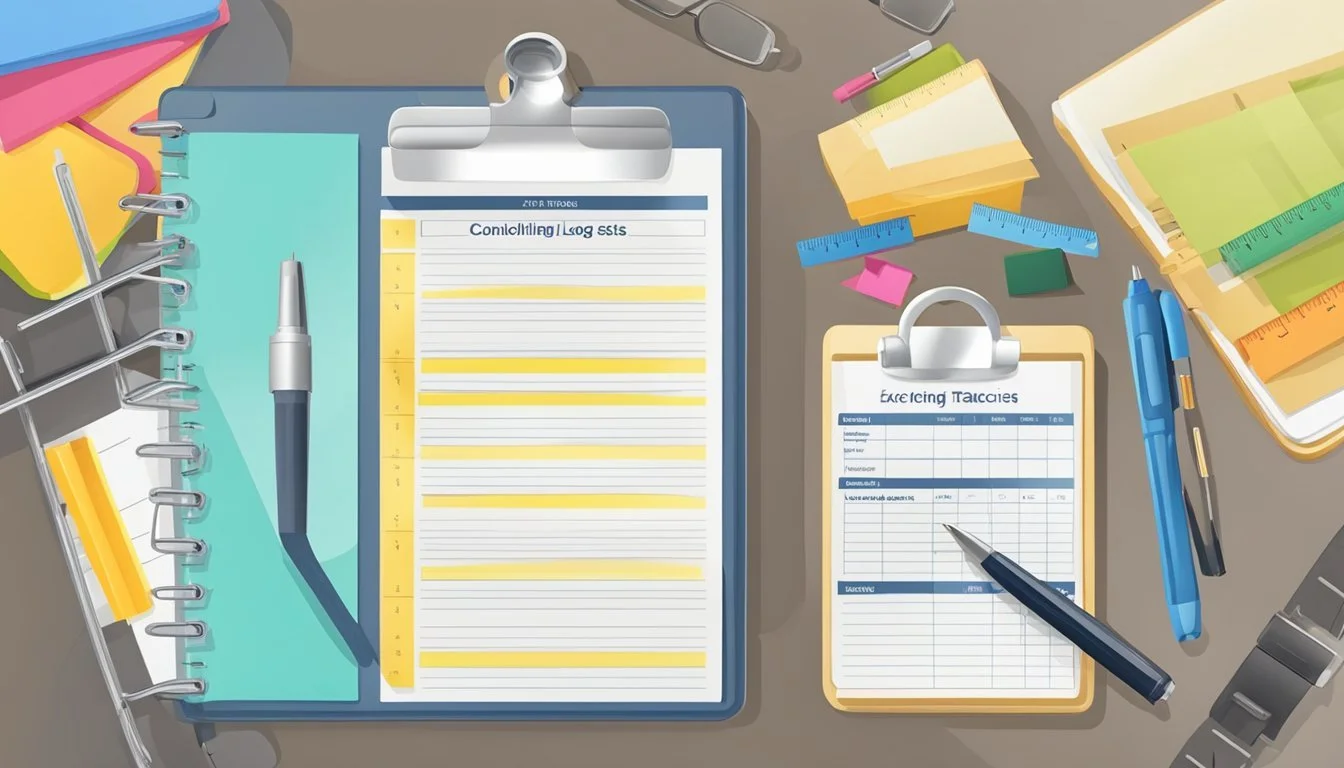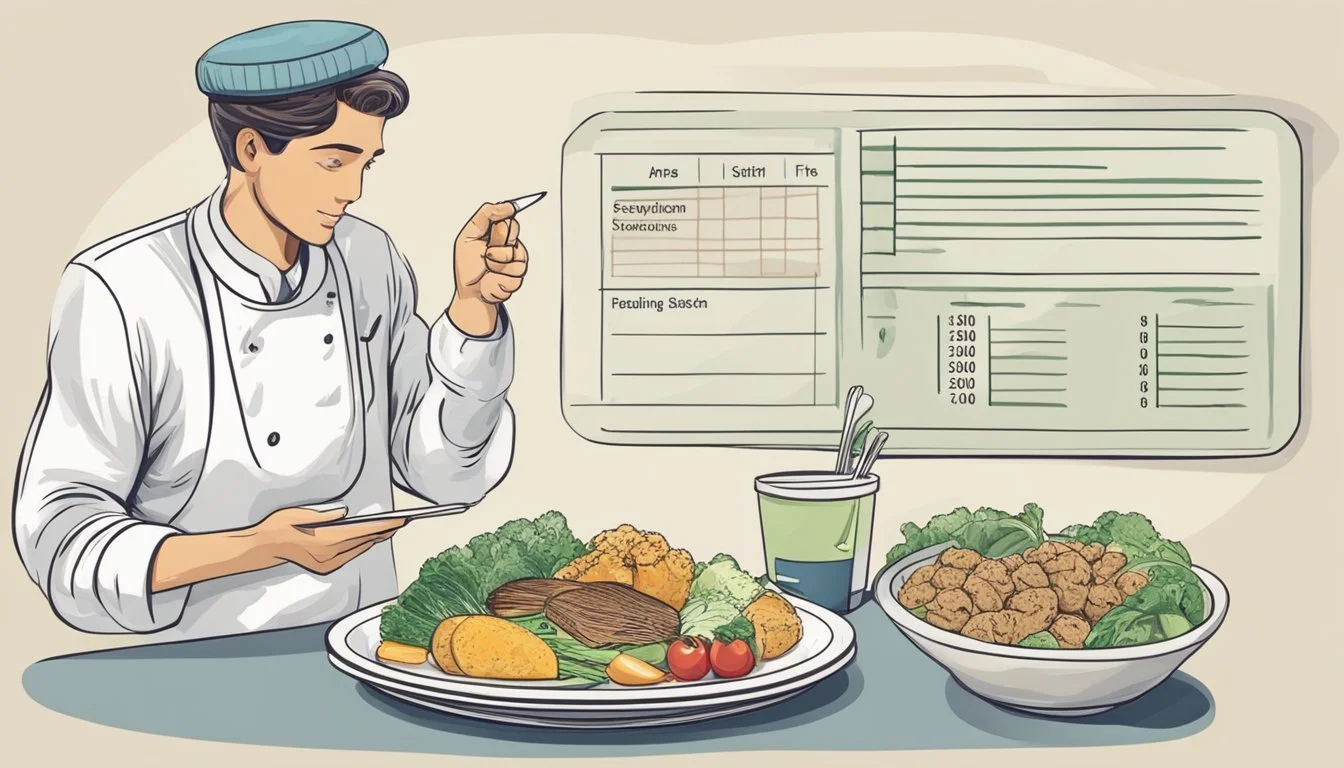11 Tactics Narcissists Use to Control Their Partner's Diet and Exercise Habits
A Comprehensive Guide
Narcissistic individuals often exert control over various aspects of their partner’s life, including diet and exercise habits. This control can manifest in subtle ways, gradually influencing the partner’s decisions and behaviors related to health and fitness.
Understanding these tactics is crucial for recognizing the early signs of manipulation and maintaining autonomy in one's lifestyle choices. By being aware of these behaviors, individuals can better safeguard their well-being and establish healthier, more independent routines.
1) Counting Calories Obsessively
Narcissists often use calorie counting as a way to exert control over their partners. By fixating on the number of calories consumed, they can create an environment of constant scrutiny.
This tactic can make their partner feel inadequate or guilty about their eating habits. It often leads to a constant state of anxiety, as the partner may feel they can't eat freely without criticism.
Over time, this obsessive calorie counting can erode individual autonomy. The partner might start to doubt their own choices and rely on the narcissist's approval for what to eat.
Such control can also extend to exercise routines. The narcissist might insist on specific workout regimes, tying them to the number of calories burned to enforce their strict standards.
This level of monitoring can result in unhealthy eating patterns, as the partner may avoid nutritious foods in favor of meeting calorie limits. Frequently, this behavior aims to diminish the partner's self-esteem and maintain dominance in the relationship.
Emotional Appeals are often used to reinforce the importance of these calorie limitations, further entrenching the control dynamic.
2) Monitoring Meal Portions Closely
Narcissists often exert control by monitoring their partner's meal portions. They may do this under the guise of "helping" their partner achieve a specific body image or health goal.
They might measure out servings, track calories, or even dictate what their partner is allowed to eat. This behavior can lead to increased anxiety around food and meals, making their partner dependent on their approval.
In some cases, they might criticize their partner for eating too much or too little, further diminishing their partner's self-esteem. This control extends to social situations where they might restrict their partner’s food choices, making them feel self-conscious and controlled in front of others. The goal is to reinforce the notion that without their input, their partner cannot self-regulate effectively. For more on control tactics, visit PsychCentral.
3) Insisting on Low-Carb Diets
Narcissists often push their partners into adopting low-carb diets. They might praise the benefits of low-carb eating, emphasizing its role in weight loss and improved energy levels. This insistence can be a way to exert control over their partner's dietary choices.
They may ridicule or dismiss other dietary approaches, asserting that low-carb diets are the only effective method. This can undermine their partner's confidence in making independent dietary decisions. It's a tactic to dominate food choices and instill doubt.
By controlling diet, narcissists may also manipulate their partner's self-image and body perception. They might link low-carb compliance to feelings of worthiness or attractiveness within the relationship. This creates a power dynamic where the partner feels pressured to conform to dietary restrictions for approval.
Some narcissists may closely monitor their partner's food intake, ensuring adherence to the low-carb regimen. This constant scrutiny can lead to feelings of anxiety and guilt about food choices. It reinforces the narcissist's control over their partner's diet and lifestyle.
In severe cases, this control can extend to social settings, where the narcissist dictates what their partner can eat in public. This further isolates the partner and deepens the narcissist's hold over their daily habits.
4) Imposing Strict Meal Schedules
Narcissists often impose strict meal schedules on their partners. They may insist on eating at specific times and expect their partners to follow suit without question.
Controlling meal times allows them to assert dominance over daily routines. This control can extend to social events, making deviations from the schedule a source of conflict.
Such rigid schedules can serve as a way for narcissists to feel superior. By controlling when others eat, they reinforce their power in the relationship.
Narcissists may use meal schedules to manipulate their partner's social interactions. Insisting on eating at unusual times can isolate partners from friends and family.
Setting strict meal times may also be a tactic to control the partner's physical appearance. By dictating when to eat, narcissists can indirectly influence body weight and health.
These meal schedules can create an environment of dependency. Partners may feel they need permission to eat outside these set times. This dependency reinforces the narcissist's control over the partner's daily life.
Narcissists may become angry or punitive if the schedule is not followed. This reaction further emphasizes their desire for control and dominance.
Strict meal schedules can lead to increased stress and anxiety for the partner. Constantly adhering to another's demands on such a fundamental aspect of life can be deeply unsettling.
5) Forbidding Certain Food Groups
Narcissists may exert control by banning specific food groups from their partner's diet. This tactic limits the partner's choices and creates a sense of dependency.
They might label certain foods as unhealthy or unfit to eat. This often includes categories like carbohydrates, fats, or sugars. By doing so, they dictate what their partner can and cannot consume.
Through this control, they aim to dominate their partner's eating habits. It strips away the partner's autonomy over their food choices. This can lead to nutritional deficiencies and unhealthy eating patterns.
In some cases, forbidding certain foods becomes a way to punish or reward behavior. Compliance with the narcissist's diet rules might be met with approval. Non-compliance, however, can lead to criticism or emotional manipulation.
This form of control can have profound psychological effects. It often creates anxiety around eating and mealtime. The partner might feel constant stress about adhering to these restrictive rules.
6) Requiring Daily Exercise Reports
Narcissists often require their partners to provide daily exercise reports. This tactic involves insisting on detailed accounts of the partner's physical activities. The reports might include the duration of workouts, types of exercises performed, and even caloric burn.
By demanding these reports, narcissists can closely monitor their partner's fitness routines. They may use the information to criticize or control their partner's efforts. This behavior can lead to increased stress and anxiety.
Additionally, any deviations or perceived shortcomings in the reports can be met with negative feedback. The constant pressure to meet specific standards can make the partner feel inadequate. This can erode self-esteem and create an unhealthy focus on exercise.
In some cases, narcissists may compare the partner's exercise results to others. They might highlight perceived failures or suggest that others are doing better. This comparison can further undermine the partner's confidence. It shifts the focus from personal health to meeting the narcissist's demands.
Requiring daily exercise reports also serves as a tool for surveillance. It enables the narcissist to keep tabs on their partner's daily activities. This control over one aspect of their partner's life can extend to other areas, reinforcing the narcissist's dominance.
7) Criticizing Food Choices Regularly
Narcissists often criticize their partner's food choices. This tactic serves to undermine the partner's confidence and self-esteem. By mocking or belittling what their partner eats, narcissists create a sense of inadequacy.
These criticisms might focus on the nutritional value of the food. For example, they may highlight unhealthy eating habits or make snide remarks about calorie intake. This constant scrutiny can cause the partner to second-guess their decisions.
In some cases, narcissists use this tactic to exert control. They may insist that only their choices are correct and dismiss any alternatives. This behavior leads to a dependence on the narcissist for approval and decisions about diet.
Such behavior can also be linked to body image. Narcissists might tie food choices to weight or appearance, further increasing their control over their partner. This manipulation can lead to unhealthy eating patterns and low self-esteem.
When the criticized partner changes their habits to please the narcissist, it reinforces the partner’s dependency. The ultimate aim is to keep the partner in a state of doubt and submissiveness. This is a common tactic explored in discussions about narcissists and food, as seen in Narcissists & Food - A Psychological Game of Control & Critique.
Understanding these patterns reveals how deeply criticism can affect the victim’s relationship with food and self-image. It’s a deliberate strategy to maintain dominance and control. The partner’s autonomy over their diet is diminished, often unnoticed until the pattern is identified.
8) Using Food as a Reward or Punishment
Narcissists often use food to control their partner’s behavior. By rewarding positive behaviors with favorite meals or treats, they reinforce compliance. For example, a narcissist might promise a special dinner if their partner completes a task.
Conversely, food can be withheld as a form of punishment. Denying meals or favorite foods can be used to create a sense of power and control. This manipulation can lead to fear and anxiety about food access.
In some instances, narcissists will restrict calorie intake to control weight and appearance. They may criticize their partner's eating habits to lower self-esteem. This serves to make the partner feel dependent and powerless.
Such tactics can significantly impact physical and mental health. Over time, these behaviors can lead to eating disorders or other health issues. By controlling food, narcissists maintain dominance in the relationship.
Partners might not even recognize the subtlety of this manipulation. Often, it exists under the guise of concern for health or fitness. This deceptive behavior keeps the partner off balance and under control.
Learn more about these tactics from articles like the one on food as punishment to gain deeper insights.
9) Limiting Social Eating Opportunities
Narcissists often restrict their partner's opportunities to eat socially. By doing this, they can control their partner's diet more effectively and isolate them from social support networks.
They may make their partner feel guilty for eating with others or fabricate reasons to prevent social dining. This tactic reduces the partner's chances to enjoy meals outside the narcissist's influence.
In social settings, they may criticize food choices or enforce strict dietary rules. This behavior aims to create anxiety around social eating and diminish the partner's enjoyment of these experiences.
Limiting social eating opportunities also serves to keep the partner dependent on the narcissist for approval and guidance on what to eat. This deepens the control the narcissist has over their partner's eating habits.
This approach can lead to increased feelings of isolation and dependency, making the partner more susceptible to the narcissist's influence over time. By cutting off social dining, narcissists further tighten their grip on their partner's social interactions and eating routines.
10) Prohibiting Snacks Between Meals
Narcissists often exhibit control over their partner's eating habits by prohibiting snacks between meals. This tactic allows them to assert dominance and enforce strict rules around food consumption.
By controlling access to snacks, narcissists reinforce their authority. This can leave their partners feeling deprived and reliant on meal times dictated by the narcissist.
The prohibition of snacks can also disrupt normal eating patterns. Many people benefit from small, healthy snacks to maintain energy levels and stable blood sugar. Denying this can lead to fatigue and irritability, reinforcing the narcissist's control.
In addition, restricted snacking can create an unhealthy focus on food. It can lead to obsessive behavior around mealtime, making the partner's life revolve around food rules set by the narcissist.
This tactic is a subtle yet powerful form of dominance. It exemplifies the way narcissists use food to manipulate and control their partners, contributing to an unhealthy dynamic. For further insights into how narcissists use food as a tool for control, consider reading about their weird eating habits.
11) Enforcing Rigorous Workout Plans
Narcissists may impose strict workout regimens on their partners to maintain control over their physical appearance and routines. They often use these plans as a means to exert dominance and ensure their partner conforms to their ideals.
By dictating specific exercises, timing, and frequency, they limit their partner's autonomy. This not only affects the partner's physical health but also reinforces the narcissist's control over their daily schedule and leisure activities.
Such actions can lead to increased pressure and stress for the partner, making them feel trapped and constantly judged. Narcissists might also belittle their partner if they fail to meet these rigorous demands, adding emotional abuse to the mix.
This constant push for perfectionism can be exhausting and detrimental to the partner’s mental and physical well-being. Some partners may feel compelled to comply out of fear of criticism or rejection.
If they protest, narcissists might accuse them of being lazy or uncommitted, further manipulating their emotions. This tactic ensures the partner remains in a state of constant anxiety and self-doubt, questioning their worth and capabilities.
Psychological Manipulation
Narcissists often use subtle yet potent strategies to control their partner's diet and exercise habits, deploying tactics like guilt and shame or imposing strict food restrictions. These manipulations can deeply impact the victim's physical and emotional well-being.
Using Guilt and Shame
Narcissists frequently employ guilt and shame to influence their partner's eating and exercise routines. By making their partner feel guilty about their food choices or body image, they can create a sense of inadequacy and dependence. This tactic often includes statements that imply disappointment or disapproval, such as questioning why their partner isn't eating healthier or exercising more.
They may also compare their partner unfavorably to others who supposedly have better habits, further deepening feelings of shame. These manipulative comments can cause the victim to internalize negative beliefs about themselves, leading to anxiety and stress. Over time, this constant barrage of guilt and shame can erode self-esteem and make the partner more susceptible to further control.
Implementing Food Restrictions
Another common tactic is implementing strict food restrictions. Narcissists may set specific rules about what their partner can and cannot eat, often under the guise of promoting health. These restrictions can be arbitrary and constantly changing, making it difficult for the partner to navigate their own diet.
Food restrictions might include banning certain foods, enforcing caloric limits, or demanding that all meals meet specific nutritional criteria. This method not only undermines the partner's autonomy but also makes them overly reliant on the narcissist's approval.
Through this control, the narcissist can monitor and manage their partner’s eating habits to reinforce dependency and obedience. This constant scrutiny can lead to disordered eating patterns and heightened anxiety around food, ultimately affecting both physical health and emotional stability.
Emotional Control
Narcissists often exert emotional control to manipulate their partner’s diet and exercise habits. They may use subtle tactics such as social isolation during meals or creating anxiety around eating to maintain dominance and control.
Isolation from Social Meals
Narcissists frequently isolate their partners from social dining situations as a means of control. By removing them from group settings where normal eating behaviors are modeled, narcissists can introduce their own dietary rules unchallenged. This can involve scheduling mealtimes that conflict with social gatherings, discouraging dining out with friends, or expressing disapproval of eating foods offered at social events.
Such isolation can create a dependency on the narcissist for approval and guidance about what to eat, reinforcing the control. It also limits the partner's social support network, making them more vulnerable to the narcissist's manipulative tactics. Friends and family may begin to notice the absence of the individual from gatherings, further deepening the isolation.
Inducing Anxiety Around Eating
Narcissists often induce anxiety around eating to control their partner’s diet. This can be achieved through constant criticism of the partner’s food choices, body image, or eating habits. They may employ tactics such as guilt-tripping, shaming, or ridiculing the partner to make them feel inadequate or self-conscious about their eating behaviors.
Through these manipulative techniques, the partner becomes increasingly anxious about making the "wrong" choices, leading to a heightened dependency on the narcissist's approval or advice. Over time, this anxiety can escalate, causing the partner to avoid eating altogether or adopt unhealthy eating patterns that align with the narcissist's expectations. This ingrained anxiety not only disrupts the partner’s sense of autonomy but also their overall well-being.












